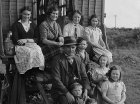Britain since 1930
A popular topic in the past has been Britain since 1930, which usually provides a focus upon World War II. It is possible to retain a study of World War II in Key Stage II provided that the unit of study either links to the locality, or shows how this was a turning point and draws links to knowledge that children have already developed. In this section you will find podcasts, articles and resources to help you plan to teach World War II as a local study or turning point in history.
Sort by:
Date (Newest first) | Title A-Z
Show:
All |
Articles |
Podcasts |
Multipage Articles
-

Jubilee medals: celebration and creation
ArticleClick to view -

The Queen in procession
ArticleClick to view -

Happy and Glorious: exploring and celebrating the Platinum Jubilee
ArticleClick to view -

Ten texts for the Platinum Jubilee
ArticleClick to view -

Back to basics: using artefacts in the classroom
ArticleClick to view -

Scheme of work: Queen Elizabeth II
ArticleClick to view -

Scheme of work: The Platinum Jubilee
ArticleClick to view -

Women and space: reaching for the stars
ArticleClick to view -

Promoting Gypsy, Roma and Traveller heritage in your primary history curriculum
ArticleClick to view -

Sporting legacy: the history of endeavour
ArticleClick to view -

How to make a toy museum
ArticleClick to view -

Anniversary: Festival of Britain 1951
ArticleClick to view -

Changes in an aspect of social history from 1945 to 2000: youth culture
ArticleClick to view -

Census 2021: using the census in the history classroom
ArticleClick to view -

Take one day: undertaking an in-depth local enquiry
ArticleClick to view -

Belmont’s evacuee children: a local history project
ArticleClick to view -

Fifty years ago we lost the need to know our twelve times tables
ArticleClick to view -

Pull-out posters: Primary History 87
ArticleClick to view -

One of my favourite history places: Studland Village
ArticleClick to view -

Anniversaries: The Coventry Blitz and the Grave of the Unknown Soldier
ArticleClick to view

